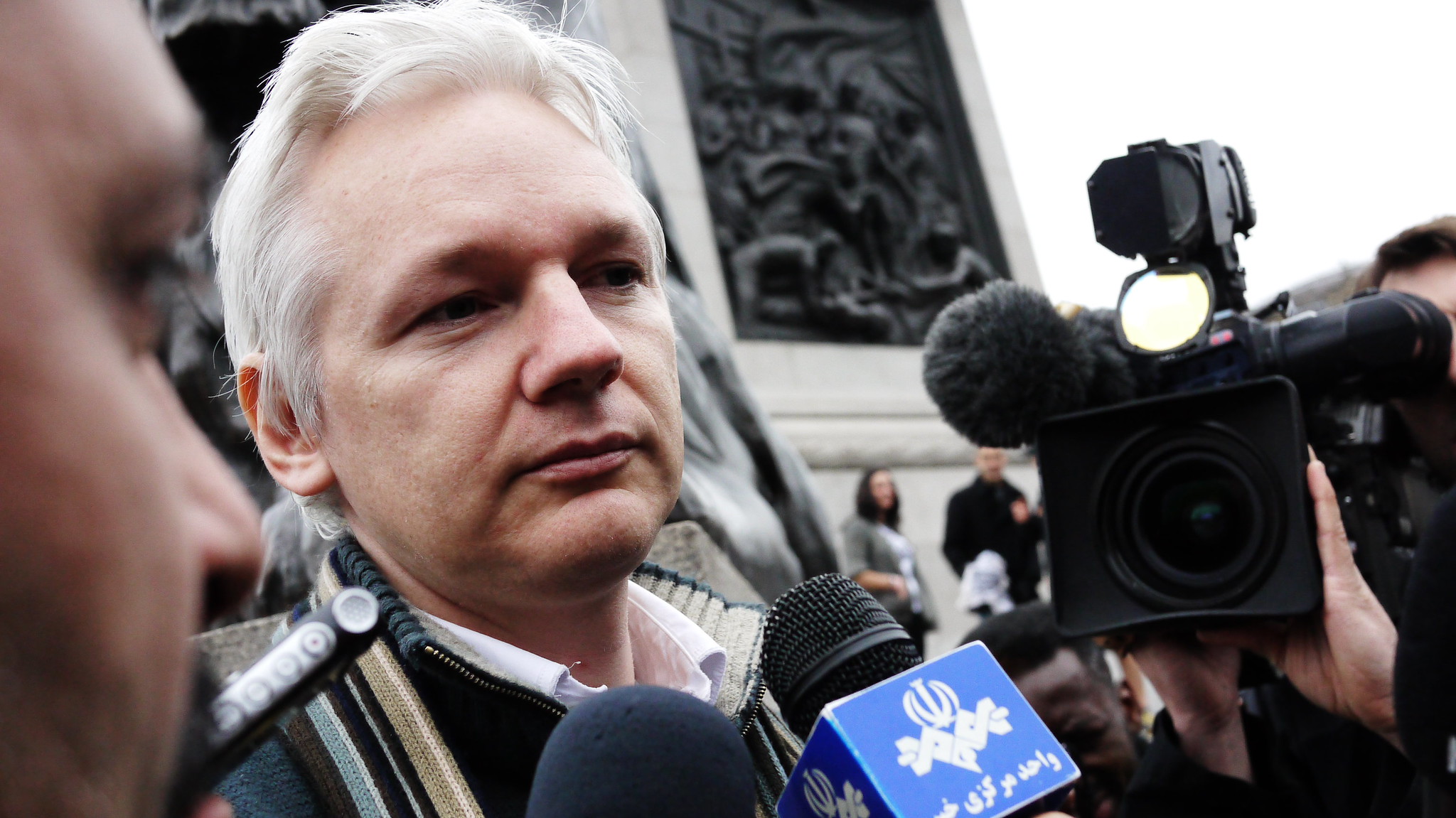Owen Bowcott on Italian investigative journalist Stefania Maurizi’s new book documenting attempts to demonise and destroy Julian Assange and WikiLeaks and her seven-year battle to access government information.

Julian Assange at the Stop the War Coalition rally in London, Oct. 8, 2011. (Haydn, Flickr, CC BY-NC-SA 2.0)
By Owen Bowcott
Declassified UK
 When the WikiLeaks founder Julian Assange was dragged out of Ecuador’s London embassy in handcuffs three years ago, he was clutching a book given to him by the Italian investigative journalist Stefania Maurizi.
When the WikiLeaks founder Julian Assange was dragged out of Ecuador’s London embassy in handcuffs three years ago, he was clutching a book given to him by the Italian investigative journalist Stefania Maurizi.
Gore Vidal’s History of the National Security State argues that America’s “military-industrial-security complex” exploits fear of the enemy in order to generate vast state subsidies. The Australian reinforced the message by shouting: “U.K. must resist.”
Maurizi had brought the volume to help the fugitive Assange keep his mind active during the six years and 10 months he spent inside his cramped diplomatic sanctuary. It was one of many visits she made.

Stefania Maurizi.
A journalist with a maths degree, she has written about cryptography. Her first contact with WikiLeaks was in 2009 when she received a call in the middle of the night asking for help verifying and interpreting a leaked audio file which hinted at Italian state-mafia deals during a rubbish collection crisis.
The following year Maurizi met Assange in Berlin. She had gone to talk to WikiLeaks about their Afghan War logs which contained secret files detailing Italian military participation in the war.
Assange had flown in from Stockholm where Swedish police had just opened an investigation into allegations against him of rape and sexual molestation; his luggage had gone missing when he arrived in Germany.
[Related: The Leak That ‘Exposed the True Afghan War’, Consortium News.]
Her book, Secret Power, is a passionate and well-paced defence of WikiLeaks and Assange published as the 51-year-old continues to resist extradition to the United States. If convicted of offences under the U.S. Espionage Act, he faces prison sentences of up to 175 years.
This is not the first book about WikiLeaks but it is a comprehensive account —enlivened with eyewitness reporting — which follows the twists and turns of Assange’s life, WikiLeaks’ revelations, media falling-outs, the Swedish criminal investigation, court hearings, surveillance of his embassy bolt-hole, alleged plots to kill him and detention in Belmarsh high security prison.
CIA Rendition
The narrative is bolstered by historical asides on such diverse matters as the first publicly available email encryption programmes; Assange’s conviction in 1996 for hacking (he was fined AUS$2,100); and the Guantanamo Bay detainee held because he lost a village lottery. The whistleblowers Chelsea Manning and Edward Snowden inevitably feature prominently.
[Related: “Inside WikiLeaks: Working with the Publisher that Changed the World” by Stefania Maurizi, Consortium News.]
One well-chosen example is the February 2003 rendition of the imam Abu Omar. Snatched off a Milan street in daylight, he was first taken to an American air base in Aviano, near Venice, then removed to Egypt where he was subjected to torture involving, he later said, sexual assaults and electric shocks.
Despite 26 U.S. citizens, many of them C.I.A. agents, eventually being convicted for their part in the abduction, none have ever been returned to Italy to serve any of their jail sentences. Some were even pardoned by Italian presidents.
That pattern of immunity from serious punishment for senior officials has been all too frequently repeated. When U.S. General David Petraeus gave his lover and biographer eight notebooks full of classified material from his Afghan campaigns, he reached a plea bargain resulting only in two years’ probation and a $40,000 fine.
Demonisation
 By contrast the pursuit of Assange has involved “demonisation” of the Australian, according to Maurizi who catalogues repeated attempts to destroy WikiLeaks that have allegedly gone as far as plans to kidnap and murder its members.
By contrast the pursuit of Assange has involved “demonisation” of the Australian, according to Maurizi who catalogues repeated attempts to destroy WikiLeaks that have allegedly gone as far as plans to kidnap and murder its members.
Accusations that WikiLeaks has put lives at risk by publishing leaked military and diplomatic documents have, she suggests, been a way of distracting the public from revelations about killings carried out by U.S. troops.
Maurizi, who works for the Italian newspaper Il Fatto Quotidiano, has for the past seven years also been waging a solo freedom of information (FOI) battle seeking to establish why the sexual-assault allegations against Assange were stalled at a preliminary stage for so long.
She submitted FOI requests in Sweden, Britain, the U.S. and Australia requesting files on the legal investigation and correspondence between prosecutors in the four countries.
Sweden — the first country, in 1766, to pass freedom of information legislation — was the most responsive. The documents she obtained showed that the Crown Prosecution Service (CPS) in London had advised against questioning Assange in the U.K., suggesting it would be better to interview him once he was returned to Stockholm. With Assange resisting extradition that effectively created years of legal paralysis.
Maurizi had to appeal to an information tribunal and contribute to costs out of her own pocket in order to extract relevant files from the CPS. Many, it turned out, were heavily redacted; other key exchanges between London and Stockholm had been deleted.
The tribunal eventually rejected her appeal for more documents but, significantly, did describe WikiLeaks as a media organisation — a journalistic status that U.S. prosecutors refuse to acknowledge. The Swedish investigation was only finally dropped in November 2019. [It was dropped three times, the first time just days after the allegations were made.]
Prosecutors said that, although the complainant’s evidence was credible, after nearly a decade the witnesses’ memories had faded. Assange always denied the allegations against him.
The blame for unedited documents [with the names of U.S. informants] being inadvertently released online in 2011, Maurizi maintains, lies with others [two Guardian journalists]. Her experience of WikiLeaks, she says, was that they checked and authenticated documents before publication. And it was a WikiLeaks editor, Sarah Harrison, she points out, who rescued Edward Snowden from Hong Kong and the threat of U.S. prosecution.
This book provides fresh insights into a ferociously complex and controversial saga. After more than three years in Belmarsh prison, Assange has lodged an appeal against the decision approving his removal made by the former Home Secretary Priti Patel. The legal and political fight continues.
***
Secret Power: WikiLeaks and its Enemies is published by Pluto Press.
Owen Bowcott was on The Guardian for more than 30 years, most recently as legal affairs correspondent. he has also worked for BBC Panorama and The Daily Telegraph.
This article is from Declassified UK.

“Prosecutors said that, although the complainant’s evidence was credible, after nearly a decade the witnesses’ memories had faded. Assange always denied the allegations against him.”
This sentence requires contextualisation and clarification. Nils Melzer in his investigation of the rape charges found massive anomalies in the case against Julian.
Melzer spoke fluent Swedish and had access to the original files. He discovered neither of the two women wished to file rape charges against Julian. The Chief Prosecutor of Stockholm had initially closed the case after deciding there was no case to answer and the case was then reopened by another highly politically motivated prosecutor.
The charges were dropped on 3 separate occasions by the Swedish authorities, hardly likely if the charges were credible.
Nils Melzer realised, from the beginning, that the case against Julian, was politically motivated .
Ecuador realised this when they granted asylum on political grounds having accepted Julian’s concerns that the U.S. would seek his extradition and lock him up for the rest of his life.
Nils Melzer stated that “ it is astonishing how often one still hears well-informed, otherwise reasonable people say about Julian Assange” “but he ran away from Swedish rape charges by hiding in Ecuador’s embassy in London.”
The allegations against Julian were never credible and always politically motivated. No charges were ever filed.
Julian Assange is being treated worse by the Australian Government than Ned Kelly was. Before the Canberra PM goes for a Dump ,he has to Phone Pine Gap.
I have purchased Ms. Stefania Maurizis’ book, and even after only a short way into it, it is becoming ‘unputadownable’.
Early on in l’affaire Assange, I was struck by how many “alternative” leftish new sites were hating on Assange! They chugged the propaganda koolade and blamed Assange for Mrs. Clinton losing the election in 2016, not her obvious contempt for working people, her excessive love for Silicon Valley robber baons. I fear such members of the Church of Hillary (Fundamentalist) are still hostile to Assange, even if not as openly as before.
We should also point out that:
1. If Prime Minister Anthony Albanese chose to, he could make UK Prime Minister Rishi Sunak end the UK’s illegal imprisonment and torture of Julian Assange today, but he has chosen not to; and
2. A check of the House of Representatives Hansard for this year 2022 (hxxps://www.aph.gov.au/Parliamentary_Business/Hansard/Hansreps_2011) shows that the words “Julian Assange” have have barely appeared for the year 2022. (I suspect the same is true of the Senate.) Whilst members of the “Bring Julian Assange Home Parliamentary Support Group” have, on several occasions, been prevented, by the use of arcane rules, from putting their various foreshadowed motions in support of Julian Assange to either the House or the Senate, I, nonetheless, think they could try a little harder than they have, firstly, to put Julian’s case to Parliament and, secondly, to make the public more aware of how free speech and democracy have been so outrageously suppressed in Parliament by the major Parties.
Please see my article “For how much longer can your Parliament remain silent about the monstrous treatment of Julian Assange?” (7/11/22) at hxxps://candobetter.net/admin/blog/6495/how-much-longer-can-your-parliament-remain-silent-about-monstrous-treatment-julian
Thanks for the link James. I loved the “Aussiecossacks”. They were wonderful. Great guys.
As we vote today, progressives should remember that Assange’s great “crime” was exposing Hillary Clinton and the Democratic Party in 2016. Before that, he seemed just a nuisance the Deep State could afford to ignore.
Fugitive? REally? Did you just call Julian Assange a fugitive?
He was a fugitive during the time he spent in the Ecuadoran Embassy, from a charge of skipping bail.
Yes, he did. This shows just how easy it is to use the language of the persecutors after years of, well, persecution.